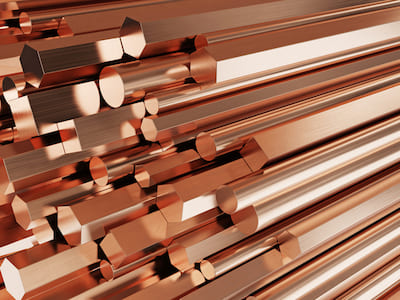Why Copper Products Are Necessary for Electrical Applications and Effective Circuitry
Why Copper Products Are Necessary for Electrical Applications and Effective Circuitry
Blog Article
Exploring the Diverse Applications of Copper Products in Modern Industries
Copper items have actually established themselves as essential parts across a myriad of modern-day sectors, primarily as a result of their exceptional conductivity, pliability, and resistance to corrosion. From enhancing the effectiveness of electric systems to playing an important function in sustainable energy technologies, the versatility of copper is apparent. Its recyclability placements it as a sustainable selection in production and electronic devices. As markets progressively focus on innovation and sustainability, the varied applications of copper call for a closer evaluation, especially concerning their possible impact on future technological advancements and environmental methods.
Electric Applications of Copper
Copper is a vital product in the electric market, making up roughly 60% of the overall need for non-ferrous steels internationally - Copper Products. Its premium electrical conductivity, which is virtually twice that of aluminum, makes it the preferred choice for a variety of electric applications. From wiring systems in domestic and industrial structures to high-voltage power transmission lines, copper makes certain efficiency and integrity in electrical power delivery
In enhancement to electrical wiring, copper is essential to the production of electrical elements such as transformers, electric motors, and generators. These elements leverage copper's thermal conductivity and pliability, necessary for heat dissipation and efficient performance. Additionally, copper's resistance to rust boosts the life expectancy and durability of electric systems, making it an economical service in the long-term.
The growth of eco-friendly power sources, such as solar and wind power, has actually additionally raised the need for copper in electrical applications. As industries change towards lasting power services, copper's role comes to be much more important. Overall, the flexibility and efficiency features of copper solidify its condition as a keystone material within the electric industry, driving development and effectiveness throughout different applications.
Pipes and Piping Solutions
In contemporary pipes systems, the choice of materials significantly impacts both functionality and longevity. Copper has emerged as a preferred option as a result of its distinct buildings, including deterioration resistance and antimicrobial attributes. These features make certain that copper piping continues to be risk-free and sturdy for transporting safe and clean water, an important consideration in household and business applications.
One of the crucial benefits of copper in plumbing is its capability to stand up to high temperatures and pressures, making it suitable for a variety of applications, from warm water systems to home heating and cooling down networks. In addition, copper's flexibility enables for less complicated setup in complex piping layouts, decreasing the danger of leakages and failings.
An additional noteworthy advantage is copper's lengthy lifespan, usually surpassing 50 years with proper upkeep. This durability not only reduces replacement prices yet additionally adds to sustainable techniques by lowering waste. In addition, copper's recyclability aligns with modern ecological requirements, advertising a round economy within the pipes sector.
Copper in Renewable Resource
The convenience of copper extends past pipes applications, playing an important role in the renewable energy sector. Its exceptional electrical and thermal conductivity makes it an important material in the production and distribution of eco-friendly power resources, particularly solar and wind power. In solar panels, copper is used in solar batteries and electrical wiring, promoting effective energy conversion and transmission. Its resistance to corrosion guarantees resilient efficiency, which is important for taking full advantage of energy result with time.

Moreover, as the global demand for electrical vehicles (EVs) boosts, copper's function in battery systems and charging infrastructure ends up being a lot more considerable. The product's capability to perform electrical energy efficiently is important to the efficiency of EV batteries, boosting range and billing speed.
Copper's Role in Electronics
Electronics making relies heavily on copper's remarkable residential or commercial properties, especially its high electric conductivity and thermal effectiveness. These qualities make copper an ideal option for a vast array of electronic parts, including connectors, circuit boards, and electrical wiring. The steel's capacity to effectively transmit electric signals ensures minimal power loss, which is vital in high-performance electronic devices.
Moreover, copper's thermal conductivity plays a considerable duty in warm dissipation, safeguarding sensitive parts from overheating. This is specifically essential in contemporary electronic devices, where small designs result in increased warmth generation. Copper is also preferred for its malleability and ductility, permitting it to be easily formed into detailed styles that satisfy the demands of innovative electronic applications.
With the surge of consumer electronics, telecommunications, and electric lorries, the demand for copper in the electronic devices sector remains to expand. As technologies in innovation advance, copper continues to be essential to accomplishing greater performance and reliability in digital products. Its recyclability additionally enhances its allure, as producers seek lasting options without jeopardizing quality. Therefore, copper stays a keystone product in the ever-expanding area of electronic devices.
Cutting-edge Makes Use Of in Manufacturing

One notable application remains in additive manufacturing, where copper-based materials are used in 3D printing processes. This enables the development of lightweight parts and complicated geometries, particularly in the aerospace and automotive blog here fields. Furthermore, copper's thermal conductivity makes it a suitable selection for warmth exchangers, enhancing efficiency in commercial cooling systems.
Moreover, the surge of clever production has seen the consolidation of copper in IoT tools, where its conductive abilities sustain website here sophisticated noticing technologies. In the realm of renewable resource, copper is crucial in the production of photovoltaic panels and wind generators, helping with extra effective energy conversion and circulation.
As sectors pursue sustainability and advancement, copper's adaptability and performance remain to position it as an important product, driving advancements in manufacturing and adding to the advancement of smarter, a lot more effective products.
Final Thought
In recap, copper items demonstrate amazing flexibility across different modern-day sectors. Copper Products. Their remarkable conductivity improves electric applications, while rust resistance makes certain dependability in pipes. The essential role of copper in eco-friendly energy and its crucial function in electronic devices underscore its significance in advancing sustainable practices. In addition, innovative usages in producing highlight copper's versatility and enduring value. Collectively, these applications highlight copper's essential payment to technological progression and commercial efficiency in modern society.
From enhancing the efficiency of electrical systems to playing a crucial duty in renewable power innovations, the convenience of copper is apparent. As sectors increasingly prioritize innovation and sustainability, the diverse applications of copper require a closer assessment, particularly regarding their potential influence on future technical advancements and environmental practices.
The growth of eco-friendly energy resources, such as solar and wind power, has better increased the demand for copper in electrical applications. On the whole, the versatility and efficiency qualities of copper strengthen its condition as a foundation product within the electrical field, driving advancement and efficiency across numerous applications.
The convenience of copper expands past pipes applications, playing an essential function in the eco-friendly energy field.
Report this page